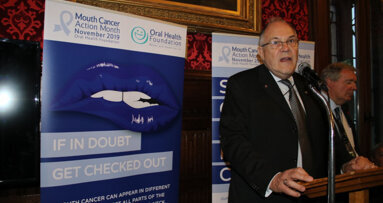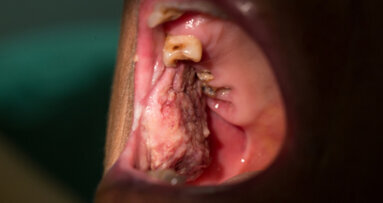BELFAST, UK: The findings of a new study suggest that regular use of aspirin could cut head and neck cancer risk by almost a quarter. The researchers found that people who consumed aspirin on a daily or weekly basis were less likely to develop the disease, which affects about 16,000 people in the UK every year, according to the British Dental Health Foundation (BDHF).
Data for the study was obtained from the US National Cancer Institute’s Prostate, Lung, Colorectal, and Ovarian Cancer Screening Trial, a large population-based randomised trial that investigates the effect of aspirin and ibuprofen on head and neck cancer risk, among others, and involves approximately 77,500 men and 77,500 women aged between 55 and 74.
As regular aspirin use was associated with a significant reduction (22 per cent) in head and neck cancer risk in this group, the researchers concluded that it may have potential as a chemopreventive agent for this type of cancer. However, no such association was observed with regular ibuprofen use.
Dr Nigel Carter OBE, Chief Executive of the BDHF, hopes that the findings will encourage further research, as mouth cancer cases are increasing worldwide. In addition, he stressed that it is important to consult a dentist if patients notice ulcers that do not heal within three months, patches, or unusual lumps or swelling in their mouth. If diagnosed too late, the survival rate for head and neck cancer tumbles to as low as 50 per cent, he said.
As reported by Dental Tribune ONLINE last year, a US study of 434 patients found that taking anti-inflammatory drugs and aspirin in particular reduces the risk of Barrett’s oesophagus, a medical condition that is the largest known risk factor for oesophageal cancer.
The current study, titled “Non-steroidal anti-inflammatory drug and aspirin use and the risk of head and neck cancer”, was published online on 28 February in the British Journal of Cancer ahead of print.
RUGBY, UK: In a large series of studies conducted in Italy and Switzerland, researchers have found that people who ate green vegetables were less likely to ...
NEWCASTLE UPON TYNE – A new study, which was commissioned by the World Health Organization (WHO), has provided new evidence that the reduction of the ...
LIVERPOOL – Owing to the absence of a uniform testing standard within the NHS, researchers have analysed a new test developed to classify ...
LONDON, UK: In order to determine the effectiveness and safety of fluoride mouthrinses in preventing dental caries in the younger population, researchers ...
RUGBY, UK/BOISE, Idaho, US: Oral cancer incidence is on the rise globally and awareness of mouth cancer remains low. To tackle the issue, the Oral Health ...
DUBLIN, Ireland: According to the Irish Cancer Society, about 550 people are affected by mouth, head and neck cancers in Ireland each year. As patients are ...
PLYMOUTH, UK: In a recent study, researchers investigated the role of oral bacteria in the development of brain abscesses. They found that the samples of ...
LONDON, England: Periodontal treatment is known to trigger a short-term systemic inflammatory response, and the systemic effects of this have prompted ...
LONDON, England: Balanced nutrition is known to lower the risk of major non-communicable diseases, including cardiovascular disease, neurodegenerative ...
Live webinar
Wed. 4 March 2026
5:00 pm UTC (London)
Munther Sulieman LDS RCS (Eng) BDS (Lond) MSc PhD
Live webinar
Wed. 4 March 2026
6:00 pm UTC (London)
Live webinar
Thu. 5 March 2026
1:30 am UTC (London)
Lancette VanGuilder BS, RDH, PHEDH, CEAS, FADHA
Live webinar
Fri. 6 March 2026
8:00 am UTC (London)
Live webinar
Mon. 9 March 2026
4:30 pm UTC (London)
Live webinar
Mon. 9 March 2026
7:00 pm UTC (London)
Live webinar
Tue. 10 March 2026
8:00 am UTC (London)
Assoc. Prof. Aaron Davis, Prof. Sarah Baker



 Austria / Österreich
Austria / Österreich
 Bosnia and Herzegovina / Босна и Херцеговина
Bosnia and Herzegovina / Босна и Херцеговина
 Bulgaria / България
Bulgaria / България
 Croatia / Hrvatska
Croatia / Hrvatska
 Czech Republic & Slovakia / Česká republika & Slovensko
Czech Republic & Slovakia / Česká republika & Slovensko
 France / France
France / France
 Germany / Deutschland
Germany / Deutschland
 Greece / ΕΛΛΑΔΑ
Greece / ΕΛΛΑΔΑ
 Hungary / Hungary
Hungary / Hungary
 Italy / Italia
Italy / Italia
 Netherlands / Nederland
Netherlands / Nederland
 Nordic / Nordic
Nordic / Nordic
 Poland / Polska
Poland / Polska
 Portugal / Portugal
Portugal / Portugal
 Romania & Moldova / România & Moldova
Romania & Moldova / România & Moldova
 Slovenia / Slovenija
Slovenia / Slovenija
 Serbia & Montenegro / Србија и Црна Гора
Serbia & Montenegro / Србија и Црна Гора
 Spain / España
Spain / España
 Switzerland / Schweiz
Switzerland / Schweiz
 Turkey / Türkiye
Turkey / Türkiye
 UK & Ireland / UK & Ireland
UK & Ireland / UK & Ireland
 International / International
International / International
 Brazil / Brasil
Brazil / Brasil
 Canada / Canada
Canada / Canada
 Latin America / Latinoamérica
Latin America / Latinoamérica
 USA / USA
USA / USA
 China / 中国
China / 中国
 India / भारत गणराज्य
India / भारत गणराज्य
 Pakistan / Pākistān
Pakistan / Pākistān
 Vietnam / Việt Nam
Vietnam / Việt Nam
 ASEAN / ASEAN
ASEAN / ASEAN
 Israel / מְדִינַת יִשְׂרָאֵל
Israel / מְדִינַת יִשְׂרָאֵל
 Algeria, Morocco & Tunisia / الجزائر والمغرب وتونس
Algeria, Morocco & Tunisia / الجزائر والمغرب وتونس
 Middle East / Middle East
Middle East / Middle East
















































To post a reply please login or register